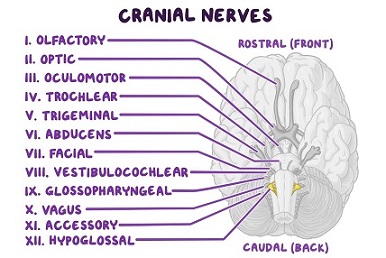COVID-19 News: Study Finds Cranial Nerve Involvement In Most Infected With SARS-CoV-2 Coronavirus
Thailand Medical News Team Aug 05, 2023 2 years, 5 months, 2 weeks, 3 days, 14 hours, 35 minutes ago
COVID-19 News: The COVID-19 pandemic has brought about numerous challenges for medical professionals worldwide, and understanding the diverse range of symptoms and complications associated with the disease has been an ongoing focus of research. Among the many mysteries surrounding the SARS-CoV-2 virus, one area that has garnered significant interest is the potential involvement of the nervous system. Emerging evidence suggests that COVID-19 can lead to neurologic symptoms and complications, some of which may persist even after recovery from the acute phase of the illness.

Researchers from Tehran University of Medical Sciences in Iran conducted a retrospective study between March and July of 2022 to investigate the involvement of cranial nerves in COVID-19 survivors. The study aimed to shed light on the prevalence of cranial nerve symptoms, identify potential predictors, and emphasize the importance of monitoring COVID-19 survivors for neurological symptoms.
The Diverse Range of COVID-19 Symptoms
COVID-19 is a complex disease that presents with a wide array of symptoms, which can vary depending on various factors such as underlying health conditions, age, and immune system status. Initially recognized as a respiratory illness, COVID-19 is commonly associated with symptoms such as fever, fatigue, cough, myalgia, and headache. However, neurological symptoms have also been observed in some cases.
Studies and past
COVID-19 News reports have highlighted a range of neurological manifestations in hospitalized COVID-19 patients, including coordination deficits, cognitive impairment, paresis, abnormal reflex status, sensory abnormalities, muscle weakness, pain, hyposmia (reduced sense of smell), and headache. Reports have also identified central nervous system involvement, with symptoms like headache, vertigo, and impaired consciousness being among the most common.
Cranial Nerve Involvement in COVID-19
Notably, cranial nerve involvement has been documented in COVID-19 patients, raising further concerns about the potential long-term consequences for survivors. The cranial nerves are essential for various sensory and motor functions, and their impairment can result in a range of neurological symptoms.
Researchers in Turkey reported cranial nerve involvement in 135 COVID-19 patients, with the olfactory nerve being the most commonly affected.
https://www.sciencedirect.com/science/article/pii/S0196070921001009
Similar results were observed in other studies, where involvement of cranial nerves VII, VI, and III led to symptoms such as hypogeusia or ageusia (reduced or loss of taste sensation), facial paralysis, or ophthalmoparesis (impaired eye movement). Other peripheral nervous system manifestations included nerve pain, skeletal muscle injury, Guillain–Barré syndrome, neuro-ophthalmological disorders, and more.
The Olfactory Nerve and Gustatory Dysfunction
The study conducted by Tehran University of Medical Sciences revealed that the olfacto
ry nerve was the most frequently involved cranial nerve among COVID-19 survivors, affecting 36.7% of participants. Additionally, over 20% of the survivors reported gustatory dysfunction, further emphasizing the impact on the sensory system.
The mechanisms leading to olfactory and taste disorders in COVID-19 patients are not yet fully understood. Hypotheses include viral invasion of the central nervous system, inflammation in the nasal mucosa, and possible involvement of ACE2 receptors in the oral cavity, among others. Some studies have also suggested an association between interleukin-6 (IL-6) levels and olfactory and taste disturbances.
Predictors and Implications
The study's regression analysis revealed that lung involvement and age were significant predictors of cranial nerve involvement among COVID-19 survivors. This suggests that patients with severe diseases and older individuals are more likely to experience neurological symptoms post-recovery.
Conclusion
The emerging evidence of cranial nerve involvement among COVID-19 survivors highlights the importance of long-term monitoring for neurological symptoms in patients who have recovered from the acute phase of the disease. Understanding the prevalence and predictors of such symptoms can aid in providing appropriate care and support for COVID-19 survivors and contribute to ongoing research efforts in combating the pandemic's multifaceted impact on global health.
While this study provides valuable insights, further research is needed to unravel the complex mechanisms underlying cranial nerve involvement in COVID-19 patients. Ongoing investigations into the virus's pathophysiology and potential long-term consequences will help medical professionals provide comprehensive care to those affected by this unprecedented global health crisis.
The study findings were published in the peer reviewed journal: Frontiers in Neurology.
https://www.frontiersin.org/articles/10.3389/fneur.2023.1182543/full
For the latest
COVID-19 News, keep on logging to Thailand Medical News.
Read Also:
https://www.thailandmedical.news/news/covid-19-symptoms-new-documented-case-shows-that-sars-cov-2-can-cause-cranial-nerve-palsy-with-resulting-double-eye-vision-diplopia
